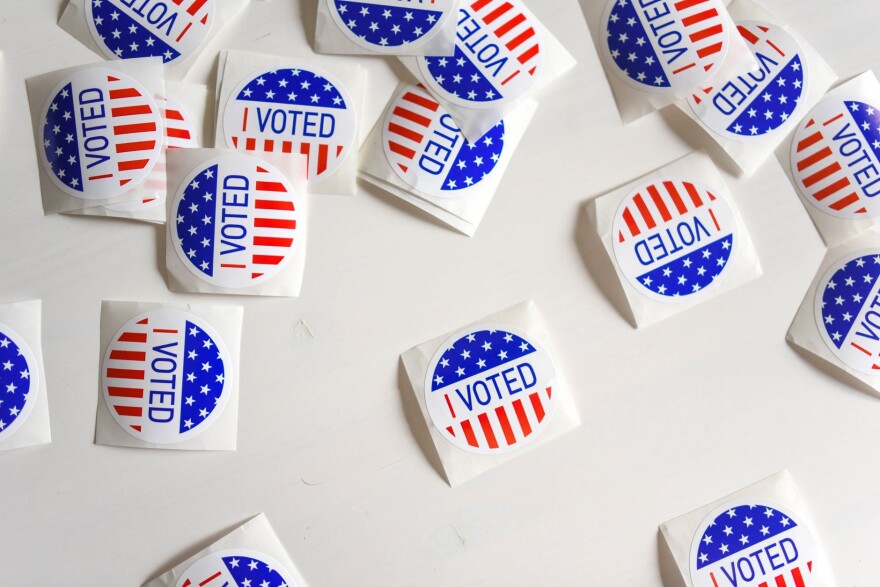New Hampshire is casting its vote in the Democratic presidential primary today, and in less than three weeks — Feb. 29 — all eyes will turn toward South Carolina. It’s a crucial vote, since it’ll be the first primary in the South and the first in which a majority of voters are expected to be African American.
How will South Carolina’s primary affect the trajectory of the 2020 Democratic race? That’ll be the focus of a taping of WFAE’s “Charlotte Talks” Wednesday night at Winthrop University in Rock Hill. Winthrop political scientist Scott Huffmon joins WFAE “Morning Edition” host Lisa Worf with a bit of a preview.
Lisa Worf: So, South Carolina has always played a big role in the Democratic primaries. Is this year going to be any different?
Scott Huffmon: No. You know, we do have an — I wouldn't say outsized role — we have an important role in both primaries, but it's mainly because South Carolina is the first test for Republicans of all types of conservatism, from social conservatism to fiscal to libertarian conservatism. But for the Democratic Party, we are the first test of African American support and African Americans make up such a core part of the Democratic Party.
South Carolina offers two tests: One who African Americans are likely to support and two, if they're enthusiastic about the candidate. And 2016 showed the importance of that second issue. Hillary Clinton beat Bernie Sanders like a drum in South Carolina. I think was 40-some-plus points, but the turnout was lower. There's not the enthusiasm. And in fact, in 2016, nationally, I believe African American vote was down 7%. So, South Carolina's really a couple of canaries in the coal mine for the Democratic Party.
Worf: And any outlook right now on how things may go in South Carolina as far as those two factors?
Huffmon: Well, what I'm seeing in South Carolina right now is still Biden up front, but how he comes out of New Hampshire will matter. You know, South Carolina is really teeing up a pitch for Biden on Super Tuesday. And it's either going to be, you know, one down the middle that he can knock out of the park or just a slider that goes right past him, depending on his strong showing or weak showing in South Carolina. He's doing really well in South Carolina.
People keep asking why. And the reason, again, goes back to the importance of African American voters. African American voters in South Carolina, in the South, in America, have been promised a lot by a lot of candidates for a long time, and very few of those policies have been delivered. So, trust is more important than policy proposals, and right now, African Americans are more likely to trust the guy that they saw had Obama's back for eight years.
Worf: But it looks like now billionaire Tom Steyer is definitely gaining some ground in South Carolina. There were two recent polls that have him coming in still a ways under Biden but second and third. Why is Steyer polling so well in South Carolina when he's coming in near the bottom of so many national polls?

Huffmon: Tom Steyer’s campaign is a master course in what money can do when it's highly focused. Down here in South Carolina, you can't get on YouTube, you can't get on Facebook, you can't get on anything without seeing a Tom Steyer ad. And it doesn't matter who you are, because I've tried this from multiple people's phones, getting on the YouTube app, putting it on incognito — no matter what you search, a tom Steyer ad comes. And it's on Facebook. It's on the cable, which is why I now went to a streaming service. But hey, guess what? It's on that streaming service, too. And so, part of that is, "OK, here's a moderate, seemingly moderate guy who might be able to beat Trump. So he may be an alternative to Pete Buttigieg, who I've never heard of before or we have no idea" — in fact, my next poll is going to ask, you know, whether or not being gay has an impact — or "I don't trust Bernie Sanders. He's never even claimed to be a Democrat until a few years ago."
And again, African Americans worry about trust. So, Tom Steyer has done an amazing job at targeting these ads, and a lot of them are very focused with usually the first and often the last lines delivered by an African American, so, incredible targeting. And boy, that money is bought and a lot of name recognition.
Worf: Now, Sanders may be gaining some unlikely voters. Last week, several GOP leaders in upstate South Carolina urged Republicans to vote for Sanders in the primary because they believe he'd be easier to beat in the general election. And Republicans can do that since it's an open primary, or semi-open primary. Do you think they'll get many Republicans to do that?
Huffmon: Well, I'd like to echo — and I forget who it was on Twitter — but it was a South Carolina longtime Republican that said, "They need a hobby, something other to do than try and meddle in elections." But the truth is, that's always the concern. Both parties sit there and say, "Listen, the other party is going to swoop in and destroy our primary." In fact, it's the Republicans currently who are pushing to close South Carolina primaries — not strongly, but they're the only ones who mentioned it.
Does it happen? Of course. Does it happen on a large scale? It really never has. So, it can change things by a few hundred votes, you know, but not in the tens of thousands of votes that you need.
Want to read all of WFAE’s best news each day? Sign up for our daily newsletter, The Frequency, to have our top stories delivered straight to your inbox.


